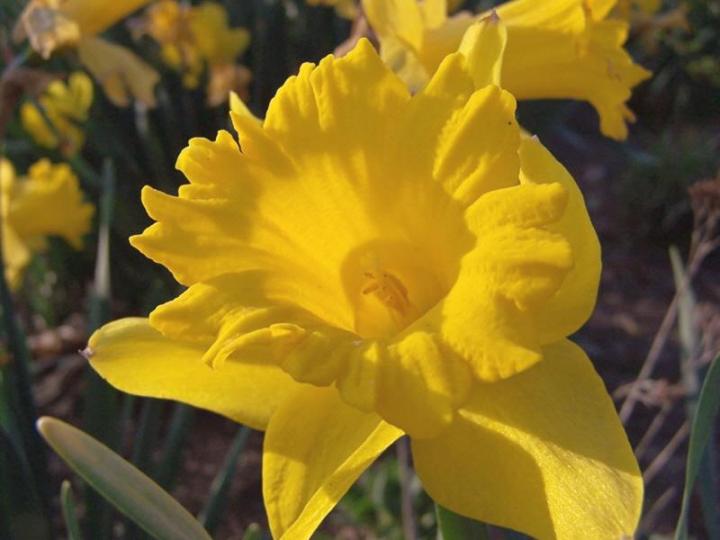






A closer look at a daffodil.
Annette McCarthyWhere to buy daffodil bulbs: Burpee Gardening
Sunny, yellow daffodils are a wonderful sign that spring has arrived! Plant the bulbs in the fall and they will bloom in late winter or early spring. Daffodils are hardy and easy perennials to grow in most areas in North America, except Southern Florida.
Their attractive flowers usually bear showy yellow or white flowers with six petals and a trumpet-shape central corona. Leafless stems bear between 1 and 20 flowers; sometimes the flowers need to be staked so that they don’t weigh down the stems.
Daffodils are suitable for planting between shrubs or in a border, or for forcing blooms indoors. They also look wonderful in a woodland garden and in large groves. You’ll find that many gardeners plant the bulbs not just by the dozens but by the hundreds! Their flowers are excellent for cutting.
Select a site that offers full sun or part shade. Most daffodils tolerate a range of soils but grow best in moderately fertile, well-drained soil that is moist during the growing season. Many of the popular species prefer neutral to acidic soils, but some prefer slightly alkaline soils, so consult your nursery.
Daffodils tend to resist deer, rabbits, squirrels, chipmunks, and other rodents (who do not like the taste of the bulbs in the Narcissus family).
The most common problems include large narcissus bulb fly, bulb scale mite, narcissus nematode, slugs, narcissus basal rot and other fungal infections, and viruses.
Chillier, but daffodillier.
–The Old Farmer’s Almanac, 1991
Daffodowndilly
She wore her yellow sun-bonnet,
She wore her greenest gown;
She turned to the south wind
And curtsied up and down.
She turned to the sunlight
And shook her yellow head,
And whispered to her neighbor:
“Winter is dead.”
–A.A. Milne, When We Were Very Young
Daffodils,
That come before the swallow dares, and take
The winds of March with beauty.
–William Shakespeare, The Winter’s Tale
I wandered lonely as a cloud
That floats on high o’er vales and hills,
When all at once I saw a crowd,
A host, of golden daffodils;
Beside the lake, beneath the trees,
Fluttering and dancing in the breeze.
–William Wordsworth, I Wander’d Lonely as a Cloud
Cannas: How to Plant, Grow, and Care for Canna Flowers
Delphiniums: How to Plant, Grow, and Care for Delphinium Flowers
Irises: How to Plant, Grow, and Care for Iris Flowers
Nasturtium: How to Plant, Grow, and Care for Nasturiums
Sedum: How to Plant, Grow, and Care for Sedum Flowers
Aster: How to Plant, Grow, and Care for Aster Flowers
Dahlias: How to Plant, Grow, and Care for Dahlia Flowers
Marigolds: How to Plant, Grow, and Care for Marigold Flowers
Zinnias: How to Plant, Grow, and Care for Zinnia Flowers
Cosmos: How to Plant, Grow, and Care for Cosmos
Copyright © www.100flowers.win Botanic Garden All Rights Reserved